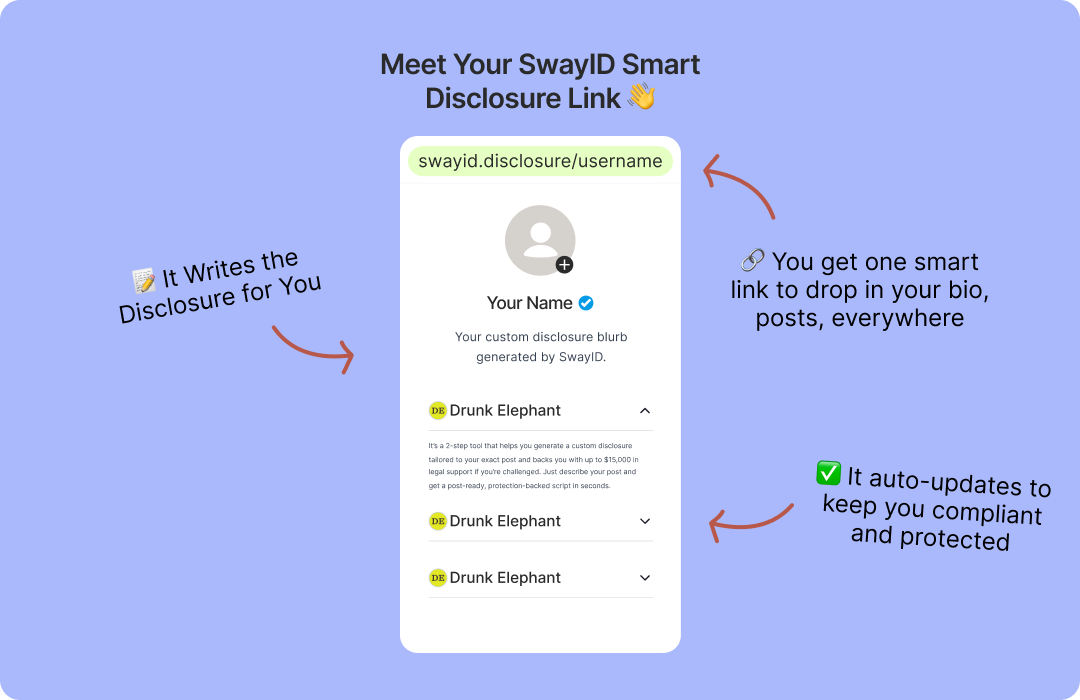
.svg)



💨 Publish truthful, compliant UGC ads in 3 minutes — not 3 weeks.



Disclosure Integrity Protocol (DIP) Compliance Framework for UGC Ads and Influencer Marketing
A statutory-grade compliance framework for user-generated advertising

Introduction
The Disclosure Integrity Protocol (DIP) is a behavioral compliance system used by advertisers, creators, and platforms to standardize, verify, and publicly log endorsement disclosures in user-generated advertising (UGA). Modeled after regulatory frameworks like SOC 2 and GDPR, DIP ensures that all influencer and creator disclosures meet statutory standards under FTC 16 CFR 255 — and are legally defensible in the face of escalating enforcement risk.
Who uses DIP?
Minimize legal exposure, prevent enforcement, and shift liability with one shared compliance system.
Advertisers
DTC brands, agencies, marketplaces
Creators
Influencers, affiliates, UGC creators
Social Platforms
Instagram, Facebook, YouTube etc.
Tooling Platforms
Creator tools, affiliate networks
Lawyers
In-house counsel, outside counsel, legal advisors
Regulators
FTC staff, enforcement bodies, researchers
The 4 Pillars of DIP
Not just a disclosure tool — a legal workflow system built to keep campaigns moving and creators compliant.
🎯 Creator compliance, solved.
FTC-compliant language, formatting, and placement rules.
🧾 Proof, locked.
Tamper-proof, time-stamped audit trail for each disclosure.
Public Linkage
Auto-updating Disclosure Status Link per creator/brand.
Shared Accountability
Digitally signed attestations; auto-generated proof artifacts.
Purpose and Impact
As AI-generated content and affiliate amplification blur advertising boundaries, DIP offers a unified system to prevent, detect, and defend against violations. It replaces today’s ad hoc disclosure practices with audit-grade infrastructure that brands, creators, platforms, and regulators can align around. With FTC fines reaching $43,792 per violation and class action lawsuits escalating, DIP establishes a durable, statutory-grade standard to protect trust, restore transparency, and ensure legal survivability in the influencer marketing era — especially for vulnerable populations like children and teens, who are most at risk of deceptive or predatory advertising.
Developed by SwayID, the first compliance infrastructure system purpose-built to protect brands, creators, and consumers from deceptive or non-compliant advertising in the AI and UGC era.
FAQs
DIP, which stands for Disclosure Integrity Protocol, is a statutory-grade compliance framework for user-generated advertising (UGA). It ensures all creator disclosures meet FTC advertising compliance standards through a structured, verifiable system adopted by advertisers, creators, platforms, lawyers, and regulators.
DIP is designed to meet legal standards under FTC regulations. While not government-issued, it formalizes compliance through court-admissible audit trails, structured workflows, and real-time public linkage — allowing brands and creators to proactively prove compliance if challenged.
DIP is used by:
-Advertisers (brands, agencies, marketplaces)
-Creators (influencers, UGC creators, affiliates)
-Platforms (social platforms, affiliate networks, creator tools)
-Lawyers (in-house counsel, compliance teams, advisors)
-Regulators (FTC, enforcement bodies, policy researchers)
Traditional disclosures are often manual, inconsistent, and unverifiable. DIP replaces that with standardized language, tamper-proof timestamps, public audit links, and shared responsibility. It transforms disclosure from a legal afterthought into a defensible system.
DIP was developed and is maintained by SwayID, but it functions as an open, systematized compliance protocol that brands, creators, and platforms can align around — regardless of the tool used.
AI-generated content, affiliate amplification, and deceptive reviews have made influencer advertising legally volatile. DIP offers the infrastructure needed to protect consumers — especially teens — while shielding honest advertisers and creators from escalating legal risk.
DIP primarily operationalizes compliance with FTC 16 CFR Part 255 (Guides Concerning the Use of Endorsements and Testimonials in Advertising), the primary regulatory standard for paid and affiliate disclosures.
The first sponsored content protection solution undergoing a live, OSF-registered field study.
We're not just claiming legal defensibility. We're proving it. Our protocol, audit rubric, and compliance outcomes are now public and traceable in real brand campaigns.










.svg)

.avif)

.svg)


